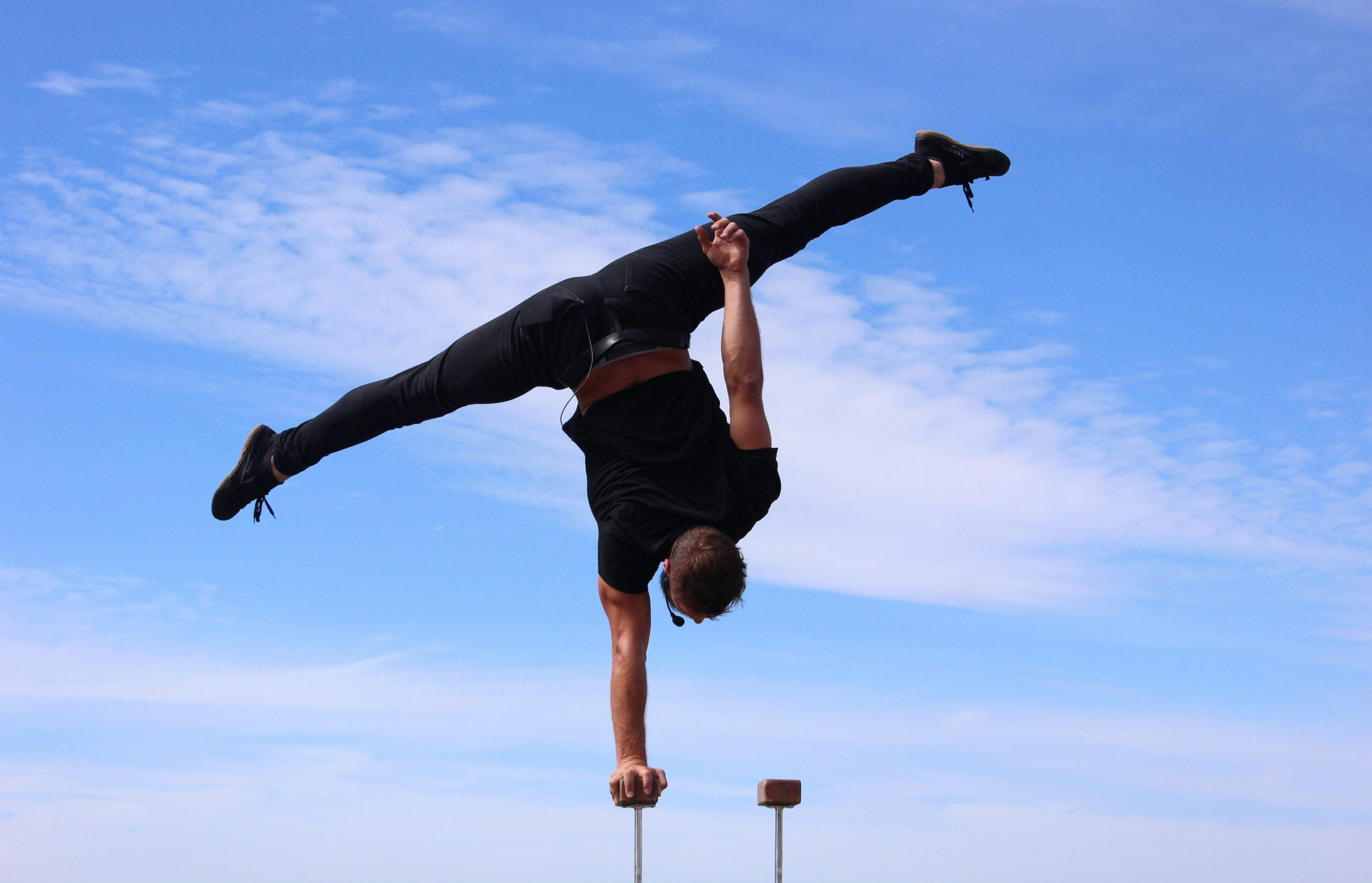The Business Athlete … sprinting, jumping, swimming, cycling … training, eating, sleeping, winning … How business leaders can learn from elite athletes to achieve better performance
January 5, 2025

I asked Richard Branson to describe his typical day. He turned to me, his face more alive and interested than when we had talked about any aspect of his business empire. “The early morning is the best part of my day. I wake early, around 5 am, and begin every day with a swim in the ocean, or bike ride, while everything is quiet, and the sun slowly rises”.
The hyper-active 74 year old founder and chairman of the Virgin Group – who started out with a student newspaper and then moved on to establish businesses in music, airlines, drinks, banking, beauty, trains and much more – is a big believer that a high quality workout in the morning sets the tone to perform throughout the day.
He often swims for an hour or more around the shoreline of Neckar, his private island in the Caribbean. Later in the day he loves a bit of kite surfing too. When staying at his boutique hotel in Morocco, he is known to cycle for 100km in the Atlas Mountains.
His greatest love, however, is tennis – challenging guests on his island, business partners and even the odd adversary. He prefers to play against people a little better than him, so that he can improve himself. “Tennis is an excellent form of aerobic exercise that improves cardiovascular health, agility, and coordination. It also helps me unwind and destress”.
As we talked more, he emphasised the importance of maintaining mental health and balance in his life. This includes taking time for mindfulness, relaxation, and reflection, which are all integral parts of his overall fitness approach. He practices gratitude and enjoys moments of peace, which he believes contribute to his mental clarity and productivity.
He also maintains a balanced diet that includes nutritious foods like fruits, vegetables, and lean proteins. When we first met, he immediately requested a green tea, although he was still recovering from a late night party. He is conscious of his health and talked about the importance of sleep, staying hydrated, and managing stress to maintain energy levels throughout the day.

What can business leader learn from elite athletes?
In search of the secrets of high performance, there is nowhere better to look than sports, and in particular what it takes to become an elite athlete. Roger Federer, Serena Williams, Lionel Messi are perfect role models for any CEO, seeking to reach the pinnacle of their profession, to sustain performance year after year, and to achieve the highest honours.
Having been involved in sports for the last 45 years, as a successful and then slower runner, I have immersed myself in athlete stories, training methods, sports science, and the latest research. Yet one of my best learnings came from listening to double Olympic marathon champion Eliud Kipchoge. The Kenyan is a humble superstar, describing his daily life, the normal routines of cooking and cleaning, playing with his kids, but also with an absolute dedication to sporting excellence, every day, year after year.
Kipchoge is a meticulous athlete, leaving no stone unturned to be the very best ever at his game. That might include regular physiological testing, daily blood lactate analysis, carefully structured training sessions, personally optimised nutrition, and plenty of sleep. He also loves to read business books – particularly Stephen Covey’s books on personal habits, and John Maxwell’s on strategy. So athletes seek to learn from business too!
- The Race of Your Life by Peter Fisk
- Achieving Peak Performance by Peter Fisk
- Eliud Kipchoge, No Human is Limited by Peter Fisk
So what can business leaders learn from athletes?
Peak performance doesn’t just happen. It takes years of development, conditioning, planning, and optimisation. It also can’t be sustained indefinitely. Kipchoge needs to be at his peak for just a few days every year. Messi, for a few hours, once or twice a week. They think in performance cycles, short and longer term, seeking to build in a carefully structured program, and deliver when it really matters with maximum impact.
Here, below, are my 12 attributes of high performance – some familiar to the business world, but others completely neglected. When harnessed effectively, they can significantly enhance decision-making, performance, and long-term sustainability. They include physical fitness, mental toughness, and personal balance, through which leaders can optimise their performance and lead their organisations with clarity and resilience.
Just as athletes like Michael Phelps, Usain Bolt, and Simone Biles, dedicate themselves to continuous improvement, business leaders must do the same. With the right mindset and habits, they can overcome challenges, lead by example, and achieve extraordinary success.

1. Personal Fitness
Just like elite athletes, business leaders must maintain a high level of physical and mental fitness to handle the demands of their roles. Fitness for business leaders isn’t just about physical health, but about mental agility, energy levels, and emotional resilience—all qualities that are cultivated through regular exercise and maintaining overall wellness.
One of the best examples of this is Serena Williams, one of the most decorated athletes of all time. Serena attributes much of her success to her dedication to fitness. Beyond the hours she spends on the tennis court, she incorporates a rigorous training regimen that includes strength training, yoga, and cardiovascular exercises. These activities keep her in top shape, enabling her to withstand the physical and mental toll of elite competition. Her commitment to fitness not only enhances her athletic performance but also supports her ability to focus, stay calm under pressure, and recover quickly—traits that are invaluable in the business world.
Business leaders who follow a similar fitness-oriented approach experience higher energy levels, better decision-making, and improved focus. Arianna Huffington has been a strong advocate for the importance of sleep and work-life balance. As the founder of The Huffington Post and CEO of Thrive Global, Huffington often discusses how the hustle culture that prioritizes productivity at the cost of rest is unsustainable. She emphasizes the need for business leaders to prioritize their wellbeing to avoid burnout and ensure that they remain effective over the long term.

2. Strategic Planning
Strategic planning in the world of sports can often be just as complex and meticulous as it is in business. Elite athletes are often required to plan years in advance, setting goals, preparing for competitions, and adjusting their tactics as necessary. These strategies are not only about preparation but also about adaptability, responding to unexpected challenges, and constantly refining the approach for maximum effectiveness.
Michael Phelps, the most decorated Olympian in history, exemplifies the importance of strategic planning. Leading up to each Olympic Games, Phelps and his coach, Bob Bowman, would develop a detailed plan for training, nutrition, and mental preparation. This meticulous attention to detail allowed Phelps to peak at the right time—at the Games themselves. His ability to break down large, long-term goals (winning multiple gold medals across different Olympics) into smaller, measurable milestones is a perfect example of the type of strategic planning that business leaders can adopt.
In the business world, leaders must similarly break down long-term objectives into achievable short-term goals. Jeff Bezos of Amazon is an example of a leader who has successfully employed long-term strategic planning to build Amazon from a small online bookstore into a global empire. His ability to focus on long-term results while navigating short-term challenges mirrors the strategic thinking of top athletes. Bezos has often spoken about focusing on the things that don’t change, such as the customer’s need for fast delivery or a great product, much like an athlete who focuses on the fundamentals of their sport, no matter how the landscape evolves.

3. Delivering Results
At the core of both elite athletes and business leaders is the ability to perform under pressure. Whether it’s hitting a game-winning shot in basketball or making a multimillion-dollar business decision, peak performance requires focus, resilience, and the ability to manage pressure.
Consider Usain Bolt, the fastest man in the world, who set the world record in the 100-meter dash during the 2009 World Championships. What made Bolt’s performance stand out wasn’t just his speed, but his calmness under pressure. During his races, Bolt exhibited a level of composure that allowed him to execute flawlessly when everything was on the line. This ability to perform under intense pressure is a key trait that business leaders can emulate. In high-pressure business situations—whether it’s managing a crisis or negotiating a high-stakes deal—being able to remain calm, focus on the task at hand, and execute strategy is critical to success.
Similarly, LeBron James is often hailed for his performance in clutch moments, particularly in the NBA Finals. His ability to make split-second decisions and execute flawless plays under immense pressure is a direct result of his mental training. LeBron has spoken extensively about the importance of mental preparation, including visualization and mindfulness exercises, which help him stay sharp during crucial moments of games.
For business leaders, cultivating a mindset that remains calm under pressure is equally important. Leaders who can think clearly, delegate tasks effectively, and communicate decisively during high-stakes moments inspire confidence in their teams. This kind of clarity of thought under pressure is what separates elite performers from others, whether in sport or business.

4. Mental Freshness
Mental freshness is crucial for sustained high performance, whether in sports or business. It refers to the ability to maintain mental clarity, creativity, and focus, even under intense pressure. For elite athletes, staying mentally fresh means having the ability to stay calm, make quick decisions, and adjust tactics mid-game without losing composure.
Roger Federer, one of the greatest tennis players of all time, is known for his mental freshness on the court. Despite being in his late 30s and competing against younger, physically superior players, Federer’s mental game is often cited as one of his greatest strengths. He has a calm demeanor and a focus that allows him to perform at a high level even in the most stressful situations. His ability to mentally reset between points, stay patient, and not let mistakes affect his next move speaks volumes about how business leaders can benefit from staying mentally fresh. When business leaders are mentally fresh, they’re able to approach challenges with new perspectives, solve problems creatively, and remain focused on their long-term goals.
In the corporate world, mental freshness can be maintained by prioritizing rest, taking breaks, and avoiding mental burnout. Bill Gates, for instance, is known to take “think weeks,” where he isolates himself in a cabin with no distractions to think, read, and reflect. These mental resets allow him to stay fresh and come up with innovative ideas that help shape the future of Microsoft.

5. Having Resilience
Resilience is the ability to recover from challenges, setbacks, and failures. For elite athletes, resilience is key to overcoming injuries, defeats, or disappointments and continuing to pursue their goals with determination.
Kobe Bryant, the late NBA legend, epitomized resilience throughout his career. After suffering a devastating Achilles injury in 2013, many speculated that his career might be over. However, Bryant refused to let the injury define him. He worked relentlessly to recover and ultimately returned to play at a high level. His resilience in the face of adversity—both physical and mental—allowed him to continue competing at an elite level for years after the injury.
Business leaders also face setbacks, whether it’s a failed product launch, a financial crisis, or a significant market shift. Leaders who demonstrate resilience in the face of these challenges inspire their teams to keep pushing forward, adapting to new circumstances, and learning from failures. Howard Schultz, the former CEO of Starbucks, exemplifies resilience in his story of turning the company around after it faced financial struggles in the early 2000s. Despite criticisms and setbacks, Schultz’s ability to persist, rethink strategies, and pivot helped revive Starbucks and make it one of the most successful global brands.

6. Self Confidence
Confidence is the belief in one’s abilities and the conviction that success is achievable. It’s a trait that helps athletes perform at their best under pressure, knowing they have the skills and preparation to succeed. Confidence doesn’t mean arrogance; it’s about trusting your training, preparation, and instincts.
Cristiano Ronaldo, one of the most famous footballers in the world, has long been known for his supreme confidence. He is constantly working on his skills, fitness, and mindset, believing in his ability to lead his team to victory. This self-belief allows him to take risks, be bold in his approach, and deliver under the brightest of lights—whether it’s a penalty kick in the final minutes or a decisive game-changing moment. Ronaldo’s confidence is contagious, motivating his teammates to perform at their highest level.
In business, confidence is equally important. A confident leader can make tough decisions, take calculated risks, and inspire trust in their team. Indra Nooyi, the former CEO of PepsiCo, was known for her confident leadership style. Despite facing challenges in a male-dominated industry, Nooyi stood firm in her convictions, making bold decisions that reshaped the company’s portfolio. Her confidence in herself, her vision, and her team was instrumental in PepsiCo’s success during her tenure.

7. Being Courageous
Courage is about stepping outside of your comfort zone, taking risks, and facing challenges head-on, even when the outcome is uncertain. Elite athletes frequently put themselves in high-pressure situations where the risk of failure is always present. Yet, it’s their courage to step up to the plate that separates them from the rest.
Simone Biles, for example, displayed tremendous courage during the Tokyo Olympics in 2021 when she made the difficult decision to withdraw from several events to focus on her mental health. In doing so, she chose to prioritize her well-being over the fear of judgment or letting down her team. This act of courage showed the world that sometimes, the most courageous thing a person can do is to take a step back and prioritize self-care when needed.
In the business world, courage is also required to make difficult decisions, whether it’s challenging the status quo, entering new markets, or making the hard choice to pivot when necessary. Elon Musk, for instance, has shown great courage throughout his career by taking risks with ventures like SpaceX and Tesla, often with no certainty of success. His willingness to take bold risks, despite the high stakes, has positioned him as one of the most innovative and influential leaders of the modern era.

8. Team Playing
While individual performance is crucial in sports and business, the ability to work as part of a team is just as important. In team sports, athletes must trust and support one another to achieve collective success. The same applies in the corporate world, where collaboration, trust, and shared goals are necessary for organizations to thrive.
Michael Jordan is one of the most famous examples of how teamwork can lead to incredible success. While he was undoubtedly an individual talent, Jordan’s leadership and ability to elevate his teammates were key factors in his six NBA championships with the Chicago Bulls. He was able to make his teammates better by challenging them, motivating them, and trusting them in crucial moments.
In the business world, teamwork is often the key to overcoming obstacles and achieving ambitious goals. Sheryl Sandberg, former COO of Facebook, emphasized the importance of collaboration and building strong, supportive teams throughout her career. Sandberg’s leadership style revolved around empowering others, building trust, and encouraging open communication, all of which are essential components of effective teamwork.

9. Having Support
Finally, athletes rely heavily on support networks, from coaches and trainers to teammates and family. This support system helps them stay focused, recover from setbacks, and maintain motivation throughout their careers. Business leaders, too, must cultivate support systems within their organizations and beyond.
Serena Williams has often spoken about the importance of her support system, including her family, coaches, and teammates. She credits her success to the unwavering support she has received, which has allowed her to overcome challenges and stay motivated through the ups and downs of her career.
Similarly, business leaders like Satya Nadella, CEO of Microsoft, emphasize the importance of having a strong team around them. Nadella’s leadership at Microsoft has focused on creating an inclusive, supportive environment where people feel empowered to take risks, ask for help, and collaborate freely.

10. Staying Agile
Adaptability is the ability to adjust to new conditions, overcome unexpected challenges, and modify strategies to remain competitive. Elite athletes must constantly adapt to changing circumstances—whether it’s a shift in their opponent’s strategy, a change in playing conditions, or even recovering from injury. Similarly, business leaders must be ready to adjust their strategies in response to market dynamics, technological advancements, and shifts in consumer behavior.
Novak Djokovic, one of the “Big Three” in men’s tennis, has exemplified adaptability throughout his career. His ability to adjust his playing style based on his opponent’s strengths and weaknesses has been key to his success. Djokovic’s flexibility in adapting his approach—from aggressive play to patient rallies—has allowed him to win against a wide range of players, on different surfaces, and in various conditions. This adaptability has kept him at the top of his game for over a decade, adjusting to the evolving nature of tennis and the fierce competition.
In the corporate world, adaptability is equally important. Tim Cook, the CEO of Apple, is a prime example of a business leader who has demonstrated adaptability. Under Cook’s leadership, Apple successfully transitioned from a focus on hardware products to a broader emphasis on services and software. This pivot became crucial as the market for smartphones began to mature. Apple’s shift towards services such as iCloud, Apple Music, and the App Store was a result of understanding changing market needs and adapting to those shifts.
Similarly, Netflix’s transition from a DVD rental service to a streaming giant was driven by its ability to adapt to technological advancements. Reed Hastings, Netflix’s co-founder and CEO, embraced the shift from physical media to digital streaming when the internet infrastructure allowed it, ultimately transforming the entertainment industry.

11. Embracing Technology
The use of data and technology in sports has revolutionized performance analysis, helping athletes refine their skills and understand their bodies better. In business, data and technology have become indispensable tools for leaders seeking to stay competitive, make data-driven decisions, and innovate within their industries.
Data analytics in sports has become a game-changer, especially in sports like basketball and soccer, where player statistics, team strategies, and performance metrics are analyzed to the smallest detail. Steph Curry, known for revolutionizing the three-point shot in basketball, utilizes data to inform his training regimen. His shooting accuracy and range have been greatly enhanced by understanding patterns and refining his technique based on statistical analysis. Teams also use advanced technology to track players’ movements on the court, evaluate shot quality, and improve overall performance. The integration of these technologies allows athletes to optimize their training, anticipate opponents’ moves, and enhance recovery strategies.
In business, the use of data has been just as transformative. Amazon has harnessed massive amounts of data to refine its customer experience, optimize its supply chain, and improve product recommendations. The company’s recommendation engine is one of the most successful examples of using data to drive business success. Jeff Bezos famously stated that “you can be more competitive by using data to your advantage,” a sentiment that resonates across industries, from e-commerce to finance to healthcare.
Moreover, technology in business allows leaders to forecast trends, personalize marketing, track performance metrics, and automate processes. Google, for instance, uses vast amounts of data to improve its algorithms and deliver better search results, while businesses can use customer data to improve products and services.
Another great example is Wearable Technology. In sports, devices like Fitbit, Whoop, and the WHOOP Strap track athletes’ heart rate, sleep patterns, and physical activity to optimize training regimens. These devices give athletes a real-time picture of their body’s needs and help them avoid overtraining. Business leaders, too, can use similar wearable technology to monitor their own health metrics, ensuring they stay physically and mentally sharp.

12. Rest and Recharge
Recovery is often overlooked in both sports and business, but it’s one of the most important factors contributing to sustained performance over time. For elite athletes, proper recovery strategies are essential for maintaining peak performance, avoiding injuries, and extending careers. This includes sleep, physical therapy, nutrition, and mindfulness practices. Business leaders also need to prioritize recovery to maintain focus, creativity, and long-term productivity.
Tom Brady, the legendary NFL quarterback, is a perfect example of an athlete who has prioritized recovery to extend his career. He has been open about his “TB12 Method,” which focuses on pliability, hydration, and a holistic approach to wellness. Brady’s recovery regimen includes an emphasis on stretching, physical therapy, and sleep, all of which have contributed to his ability to continue playing at a high level well into his 40s—an age when most quarterbacks have already retired.
Similarly, LeBron James invests a significant portion of his time and resources into recovery. Known for his intense training and commitment to fitness, LeBron also emphasizes the importance of rest and recovery. He spends over a million dollars annually on his body, including personal chefs, trainers, and cutting-edge recovery technologies such as cryotherapy and hyperbaric chambers. These efforts help him recover quickly after games and maintain his elite performance throughout the season.
In the business world, recovery also plays a crucial role in the productivity and decision-making abilities of leaders. Bill Gates has long been an advocate for maintaining balance in work and life. He is known for taking time off to read, travel, and disconnect from his daily business routine. These breaks allow him to recharge, gain new perspectives, and return to work with a refreshed mindset.

Time for a morning swim, lunchtime run, or early night?
Elite athletes offer valuable insights into how adaptability, the use of data and technology, and recovery can be leveraged for sustained performance. Business leaders who embrace these principles—by staying adaptable in a constantly changing environment, utilizing technology to enhance decision-making, and ensuring proper recovery and wellbeing—will be better equipped to navigate challenges, foster innovation, and lead their organizations toward long-term success. Whether it’s through adapting to new strategies, using cutting-edge technology to gain a competitive edge, or recognizing the importance of recovery and mental freshness, both athletes and business leaders must view these elements as integral parts of their journey toward greatness.
More from the blog